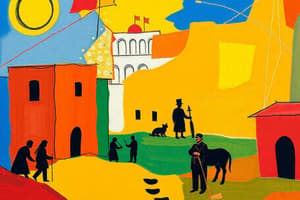Podcast
Questions and Answers
In Botswana, which level of education requires learners to pass with grades A, B, and a good C to proceed?
In Botswana, which level of education requires learners to pass with grades A, B, and a good C to proceed?
- Tertiary education
- Higher secondary education (correct)
- Primary education
- Junior secondary education
Which of the following is NOT a type of assessment conducted in Botswana schools?
Which of the following is NOT a type of assessment conducted in Botswana schools?
- Continuous assessment
- Summative assessment
- Formative assessment (correct)
- Diagnostic assessment
In Botswana, which institution was established in 2002 to guide and facilitate assessments in schools?
In Botswana, which institution was established in 2002 to guide and facilitate assessments in schools?
- Botswana Examinations Council (correct)
- Botswana International University of Science and Technology
- Ministry of Education
- University of Botswana
What is the name of the examination taken at the end of secondary education in Botswana?
What is the name of the examination taken at the end of secondary education in Botswana?
What is the name of the school established by missionaries from the Lutheran Church in 1970?
What is the name of the school established by missionaries from the Lutheran Church in 1970?
When did educating learners with disabilities begin in Botswana?
When did educating learners with disabilities begin in Botswana?
What is the name of the examination taken at the end of junior secondary education in Botswana?
What is the name of the examination taken at the end of junior secondary education in Botswana?
Which institution provides education to students with severe visual impairments in Botswana?
Which institution provides education to students with severe visual impairments in Botswana?
What is the primary provider of pre-primary education in Botswana?
What is the primary provider of pre-primary education in Botswana?
Which of the following is a major teaching strategy used in Botswana schools?
Which of the following is a major teaching strategy used in Botswana schools?
Flashcards are hidden until you start studying
Study Notes
Introduction to Education in Botswana
- Botswana is a neighboring country to South Africa, Zimbabwe, Namibia, and Zambia, with a population of over 2 million people.
- The country is landlocked, located in Southern Africa, and has a model state with political stability, economic growth, and an upper-middle-class income.
History of Education in Botswana
- During the colonial era in the 19th century, missionaries and chiefs ruled the country.
- Botswana gained independence from Britain in 1966 and is guided by four principles: democracy, self-reliance, unity, and development.
- The country's first educational policy, "Education for Kagisano (Social Harmony)," was introduced in 1977 and guided educational development and administration until 1993.
Education Policy in Botswana
- In 1994, the Minister of Education presented the "Revised National Policy on Education," which provided direction for Botswana's educational system until 2020.
- Education in Botswana is free, but not compulsory, and the Ministry of Education has authority over the educational structure except for the University of Botswana.
Educational Structure in Botswana
- The educational structure mirrors that of the United Kingdom, with universal access to primary and junior secondary school, but a process of academic selectivity reduces entrance to senior secondary school and the university.
- The curriculum incorporates prevocational preparation in junior and senior secondary school.
History of Education in Botswana (continued)
- The 1965 Education Act and Local Government Acts established the provision of primary and secondary school education.
- State budget cuts in 1965 led to the abolition of free education, and schools fees were introduced for secondary school education in 2006.
- This led to a decline in school enrollment, but later, more learners enrolled for secondary and higher education.
Teaching and Assessment in Botswana
- The mode of instruction is English from grade 4, and the dominant teaching strategy is explanations and lecture method.
- The Ministry of Education controls and centralizes the curriculum.
- The Botswana Examinations Council was established in 2002 to guide and facilitate assessments conducted in schools.
- Continuous, diagnostic, and summative assessments are written in schools.
Educational Assessments in Botswana
- Primary leaver school examinations are held at standard 7.
- Junior certificate examinations are held at the end of junior secondary education.
- A learner must pass with grades A, B, and a good C to proceed to higher secondary education.
- The Botswana General Certificate of Secondary Education is held at the end of secondary education.
Educational Provisions for Learners With Disabilities in Botswana
- Educating learners with disabilities began about 40 years ago in Botswana.
- Missionaries from the Dutch Reformed Church started the first school for children who were blind or had severe visual impairments in 1969.
- Missionaries from the Lutheran Church opened the first school for children who were deaf or had severe hearing impairments in 1970.
Studying That Suits You
Use AI to generate personalized quizzes and flashcards to suit your learning preferences.




